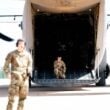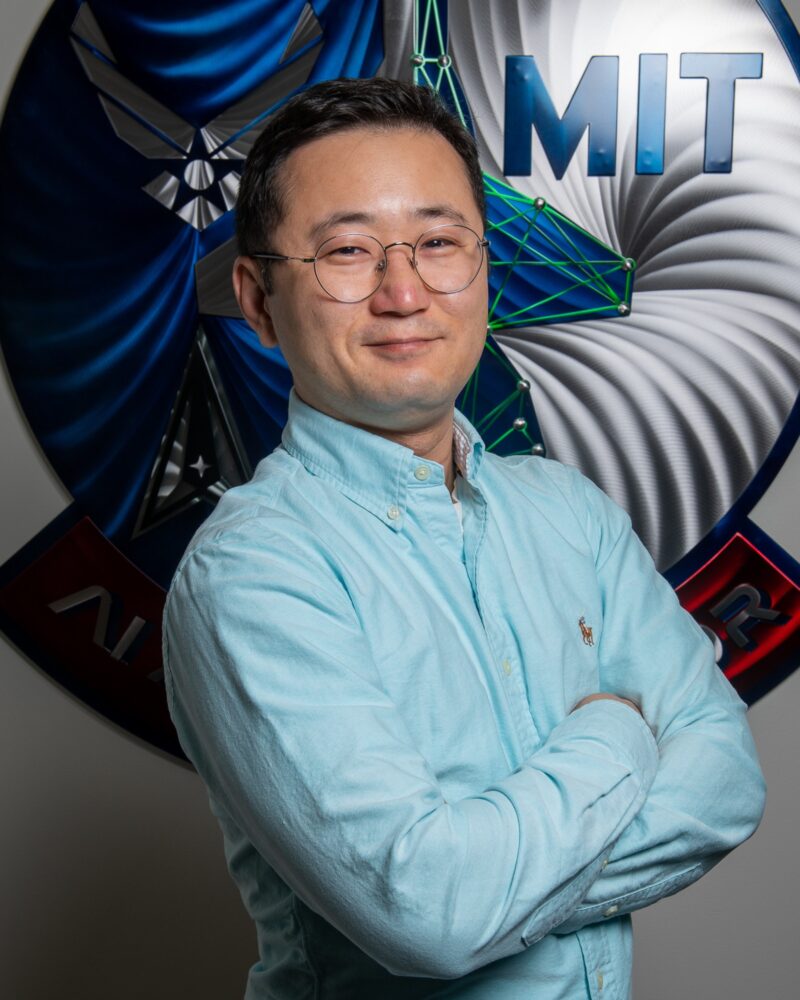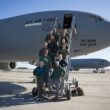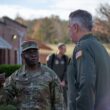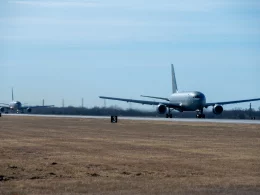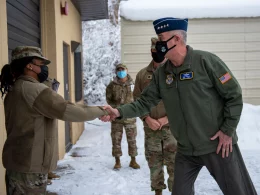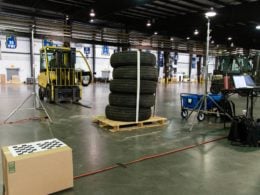CAMBRIDGE, Mass. —
A select few Airmen from across the world have emerged from the shadows to tackle a variety of different AI projects for the Department of the Air Force. What they share in common is their desire to bridge the digital divide and bring AI back to their home units to solve problems. Not all of these Airmen are engineers or programmers.
These Airmen are called Phantoms.
The Phantom Program is a comprehensive fellowship at the Department of the Air Force – Massachusetts Institute of Technology AI Accelerator, which provides opportunities to learn from the brightest minds in AI. Personnel accepted to the program are called “Phantoms” and work alongside some of the top AI researchers in the world, as well as with other Airmen and Guardians, who drive long-term DAF-MIT AI projects. Over a 5-month period, Phantoms provide their subject matter expertise to various projects and generate new processes for transitioning AI from research to operational use. Under the auspices of the DAF-MIT AI Accelerator, Phantoms delve into the deepest realms of AI, pushing past traditional boundaries and showcasing an unparalleled zeal for adapting to the digital age.
Every cohort in the fellowship is composed of both technical and non-technical phantoms. Phantoms are directly sourced from their career field managers. Non-technical phantoms are unique in the sense that they don’t necessarily have a background in computer science. All phantoms require their commanders’ approval to participate in the program.
In cohort 8, there were three non-technical phantoms in the program. One of them, Master Sgt. Hyuk Yoo, Section Chief for Force Management and Customer Support at the 316th Force Support Squadron, Joint Base Andrews, Md., saw a great opportunity in the DAF-MIT AI Accelerator to learn about AI and how these new technologies could benefit his unit and the greater Air Force.
“I see the world changing in front of our eyes and if we aren’t in the forefront of cutting edge technology, we’ll lose,” said Yoo. “I believed that through the AIA phantom program, I’d be able to learn more in-depth about the real use cases of AI in the military and how it can be adapted to suit our needs, not in just the overall big Air Force, but at the squadron level, group and wing level.”
The unstructured, results-oriented nature of the Phantom Program resonated with Yoo, allowing him the freedom to dictate the course of his research, all while harnessing the vast resources at MIT and within the AI Accelerator. The program honed his ability to manage time efficiently, seek out answers autonomously, and engage in a fruitful exchange of ideas with his cohort, comprising both technical and non-technical phantoms.
A great example of a non-technical phantom who excelled in the program, Yoo brought an experienced senior enlisted perspective to the cohort, though he acknowledged that early on he felt intimidated by the sheer knowledge that his cohort brought to the table, especially from the technical phantoms.
“During what we called our weekly ‘tech talks,’ most times I did not understand the lingo or the language, or the formulas they were talking about and I felt lost,” said Yoo. “But as time went on, I turned that intimidation into a drive to learn as much as possible, leveraging my cohort’s knowledge and expertise to also help with my own research and studies. ”
Yoo was specifically interested in Machine Learning and Large Language Models. His interest stemmed from his day-to-day, commonplace wonder of how his phone seemed to know when to display the time needed to get to work. This kind of initial curiosity is an enduring trait shared by all Phantoms in the program.
But wonder and curiosity are not the only prerequisites for success in the program. Every Phantom is required to write a publishable paper on a subject of their choosing relating to AI, but which also has to have a direct link to any problems their home unit may be facing.
As a Force Support professional, Yoo researched Large Language Models, like ChatGPT, and how they could augment Force Support Squadron Functions. With AI assistance, he argued in his paper, FSS technicians can be better trained and provide better services to the base by working smarter, not harder. FSS is all about helping and assisting customers, which AI can further advance.
“I believe that Machine Learning and Large Language Models have come a long way and advanced far enough that we at the FSS can tap into its functionalities just like other large corporations,” said Yoo. “I took advantage of what the DAF-MIT AI Accelerator has offered me with the tools to learn AI, then I identified a home unit problem, found different approaches to the solution, and used that to possibly apply it to a real work setting.”
The result was Yoo’s development of an AI-based digital assistant that could significantly automate and streamline operations within the FSS, specifically enhancing service delivery to the squadron’s clients and simultaneously decreasing the work burden for personnelists.
“The AI-assistant bot will be further tested for accuracy with responses and then we hope to add it to our FSS homepage for customers very soon!” Yoo said.
Another non-technical phantom in cohort 8 was Kimberly Parker, community partnership manager and legislative liaison for the 82nd Training Wing at Sheppard Air Force Base, Texas. As the only public affairs professional in their cohort, she brought a unique communications background to the DAF-MIT AI Accelerator, which traditionally does not have a public affairs position on its permanent staff.
“I come from a background that is heavy on writing and reading, so you can imagine coming into this was a bit daunting,” said Parker. “But I was really drawn into how AI has the potential to enhance a wide range of Air Force capabilities, as we saw during cohort 8’s time involving the MagNav project.”
Parker was instrumental in communicating this significant achievement for the DAF-MIT AI Accelerator. At the same time, as a non-technical phantom, she was feverishly completing education and project requirements for the fellowship, like her own paper.
“I wrote my paper on advancing technical training by using AI,” said Parker. “My home unit at Sheppard is working hard to modernize its technical training to uphold the U.S. Air Force’s technological edge, so I wanted to do research on how AI-based tutoring systems could be incorporated into the 82nd Training Wing’s training framework.”
Non-technical Phantoms are also different from technical phantoms by way of their other job in the fellowship – supporting the permanent party of the DAF-MIT AI Accelerator. Unlike technical phantoms, who are paired with MIT Lincoln Lab and permanent party members focused on research projects, non-technical Phantoms have an array of responsibilities that pair them up with different aspects of the organization.
Parker, for instance, reported directly to Col. Garry Floyd and Lt. Col. Chris Berardi, the director and deputy director of the DAF-MIT AI Accelerator. Parker’s role as a public affairs professional was to provide advice and counsel to the leadership, and to generate public-facing content for the DAF-MIT AI Accelerator.
“I love that we’ve been able to bring experts from the PA community into the program,” said Col. Garry Floyd, director of the DAF-MIT AI Accelerator. “In my opinion, we have to be able to speak about our pursuit of AI – here at the Accelerator and across the DAF – in a way that promotes transparency and trust.
“It is hard to effectively communicate about concepts like safe, responsible, ethical AI use without a basic understanding of data-driven, mathematical realities that enable those important objectives.”
Yoo and Parker worked alongside their fellow cohort 8 non-technical Phantom, Capt. Katie Albright, who was awarded the Director’s Impact Award for cohort 8, and chief learning officer for the DAF-MIT AI Accelerator, Maj. Megan Muniz.
Yoo, Albright, and Muniz worked to administer six AI courses to the Department of the Air Force. These courses and workshops ranged from a basic understanding of AI to offering senior leaders advanced courses in how AI could affect the DAF.
“We were responsible for liaising with Get Smarter and Emeritus, partners on these AI courses,” said Yoo. “We in the education team built the application forms, solicited for students and amassed a roster of close to 2,000 prospective learners within the DAF who are interested in AI.”
All Phantoms take back to their unit a wealth of knowledge and experience indispensable to the U.S. Air Force. Some even provide solutions to problems their home units face, like Yoo. Both Parker and Yoo agreed that the Phantom Fellowship was a once-in-a-lifetime experience they were very grateful to have had.
Both of them have made it a mission to let others know about the Phantom Program back at their home stations. At the time of this writing, the DAF-MIT AI Accelerator has responded to around 400 queries about applying to the program.
“First, I’ve already used my experience as a Phantom to let my Airmen know that such a program exists and that they can also take advantage of it,” Yoo said. “Secondly, I’ve taught my section how to utilize the available large language models to assist with our day to day, such as crafting more professional emails and utilizing time management and automation. ”
Parker’s and Yoo’s experiences symbolize the broader narrative of non-technical Phantoms thriving in the DAF-MIT AI Accelerator. Through the camaraderie built with technical phantoms in their cohort and through their relentless pursuit of applying AI to solve problems, these Phantoms are not merely adapting to the evolving technological landscape but are poised to play a pivotal role in steering the DAF towards an AI-augmented future. Further, as new AI technologies come onto the market, non-technical Phantoms are able to dive deeper into the technical aspects of programming and engineering, like never before, creating solutions and solving problems for the U.S. Air Force without necessarily having a coding background. For example, non-technical Phantoms today can now engineer their own non-coded version of ChatGPT tailored for a specific purpose, simply by using optimized prompting and written text rather than a programming language, like Python or Julia.
“The phantom program is a beacon of inclusive learning that encourages innovation and, perhaps, even disruptive thinking,” said Floyd. “When I first became engaged with AI, back when I joined Project Maven when it stood up in the summer of 2017, my AI education consisted largely of a self-guided journey through YouTube.
“I’m thrilled to see the many opportunities to learn about AI that are now available to our Phantoms, and to Airmen and Guardians around the DAF.”
The next application window to apply for the next Phantom fellowship is November 1 to December 1, 2023.
For additional details on the Phantom program, to include how to apply, please visit the Phantom Program page here.



